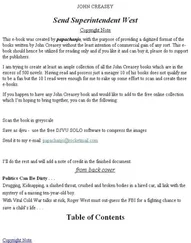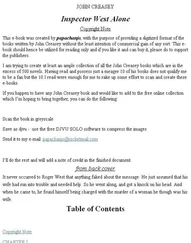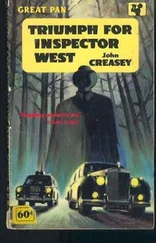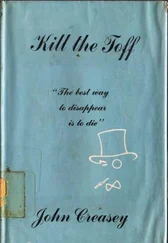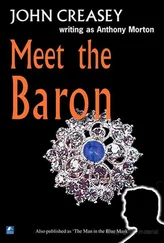John Creasey - Alibi
Здесь есть возможность читать онлайн «John Creasey - Alibi» весь текст электронной книги совершенно бесплатно (целиком полную версию без сокращений). В некоторых случаях можно слушать аудио, скачать через торрент в формате fb2 и присутствует краткое содержание. Жанр: Старинная литература, на русском языке. Описание произведения, (предисловие) а так же отзывы посетителей доступны на портале библиотеки ЛибКат.
- Название:Alibi
- Автор:
- Жанр:
- Год:неизвестен
- ISBN:нет данных
- Рейтинг книги:4 / 5. Голосов: 1
-
Избранное:Добавить в избранное
- Отзывы:
-
Ваша оценка:
- 80
- 1
- 2
- 3
- 4
- 5
Alibi: краткое содержание, описание и аннотация
Предлагаем к чтению аннотацию, описание, краткое содержание или предисловие (зависит от того, что написал сам автор книги «Alibi»). Если вы не нашли необходимую информацию о книге — напишите в комментариях, мы постараемся отыскать её.
Alibi — читать онлайн бесплатно полную книгу (весь текст) целиком
Ниже представлен текст книги, разбитый по страницам. Система сохранения места последней прочитанной страницы, позволяет с удобством читать онлайн бесплатно книгу «Alibi», без необходимости каждый раз заново искать на чём Вы остановились. Поставьте закладку, и сможете в любой момент перейти на страницу, на которой закончили чтение.
Интервал:
Закладка:
And he had to be fresh and fit next morning.
Chapter Fourteen
VISITOR
Roger yawned and rubbed his eyes. The truth was that he was in no shape to interview and interrogate anyone, wasn’t alert enough and must not attempt it; there was no emergency, and he was nearer Bell Street than the Yard. So he would go home. As he drove slowly and with extreme care, he found his thoughts roaming at will over the past with Janet. In this part of Chelsea and along the embankment, across the river in Battersea Park and a little further afield, on Clapham Common, they had done most of their courting. He had been at the Chelsea division in those days and Janet had lived in the next borough: Fulham.
She had been so lively, pretty; damn it, beautiful!
As she was beautiful today. If only she would not get so upset!
Her time of life, of course, simply heightened moods which had always existed. In those courting days she had always been acutely disappointed and often angry when he had had to break a date. Several times he had nearly lost her. He gave a twisted smile at the recollection of that, and of jealousy. When a young man was in love as utterly as he had been there was a special kind of torment in being forced to leave one’s beloved with others: knowing another man was playing tennis with her, or taking her home, or to the theatre or pictures.
And—his smile broadened—he remembered the first time he had been compelled to arrest a young woman who had resisted, almost savagely, and then turned all her considerable seductive charm on him, with Janet looking on.
Her voice came out of the past.
“You needn’t have handled her like that . . . You actually seemed to enjoy it!” And for a while there had been tension, with his heart in his boots. It had been touch and go whether they had spent the rest of the evening together. But they had; that was the very evening when they had walked along Bell Street and, as a result, started their married life in the house where they still lived. There had been clashes, all of them—well, most—over the restrictions of his job. But all of these had passed, and if it were true that of recent years the conflicts had lasted for longer periods and tension sometimes dragged on, Janet would come out of the menopause and sooner or later he would retire.
The recollection that he could resign whenever he liked and take a job that would give Janet all she asked came out of the blue. He actually let the wheel wobble for a moment and forced a passing motorist to pull out. The driver glowered. Roger turned into Bell Street, and as he did so a man came out of one of the houses, turned towards King’s Road and hurried away. There was something furtive in his manner, and Roger knew why.
The woman at that house, Natalie Tryon, was miserably unhappy, with a husband with whom she stayed only for her children’s sake. This man was her lover, who visited her whenever her husband was away.
Roger pulled up outside his own house and turned towards the garage, then put on the brakes, appalled at a sudden, devastating thought.
Supposing Janet had a lover!
Supposing she had become so lonely and miserable that she had sought and found consolation.
Wouldn’t that explain her moodiness, her attitudes, her thinking?
Roger sat absolutely rigid, and had been there for three or four minutes, hardly able to think clearly, when a shaft of light appeared from the front door, and then Janet’s silhouette appeared against the porch light.
“Darling! Is that you?”
He made himself call out, “Yes, coming!” Opening the car door, he saw her hurrying towards him. The light from street lamps were soft on her face, and she looked at her best. She moved beautifully, too. Suddenly, she was close to him, and he closed the car door softly, habitually remembering not to wake a neighbour’s baby. As suddenly, he took her in his arms, held her almost too tight for a moment, and then kissed her.
A few moments later, breathless, they drew apart. Neither spoke as they linked arms and turned towards the house, until Janet said, “Will you leave the car out?”
“Yes, it doesn’t matter on these warm nights.”
“I’ll put it away if you like,” she offered.
“No. Leave it.” They reached the porch, still arm in arm. He knew that her mood had changed even more than his, that now she was calm in spirit. He did not know how to tell her what was passing through his mind, and she saved him the need to say anything.
“You lock up, I’ll make some tea, darling, and we’ll have it in the kitchen. The boys have both gone to bed. I’ll pop up and get into a dressing-gown.”
“Good idea,” he said. He locked and bolted the front door, checked the windows of the sitting and dining rooms, then hesitated. He would be more comfortable in a dressing-gown, too, and especially in slippers. Quickly he went upstairs, and into their room.
He stopped short.
Spread across the bed were open photograph albums, loose snapshots and seaside pictures, and a glance showed that these were all of the days of their courtship and early marriage. None showed the boys, even as babies. The pillows were rucked up and the bedspread had been pulled down. On one pillow was a screwed-up handkerchief. Roger picked it up and found that it was damp; she had obviously been crying. He looked more closely at the albums; there they were at a tennis party, at a dance, with a crowd of young people on the beach: always together, always looking happy.
Roger lost himself in retrospection, now and again thinking: Thank God I came straight back tonight. He lost count of time, until, disturbed by a footfall on the landing, he looked up and saw Janet.
She came in.
“I meant to clear all that up before you came in here.” she said.
“Why, darling?”
She stood a little distance from him, and answered, “It seemed like a kind of blackmail to leave them out!”
“Some blackmail! I’ve been think about those days, too. Remember that buxom blonde I arrested at the tennis club for raiding the dressing rooms?”
“Shall I ever forget her!”
“She wasn’t unlike Maisie Dunster,” he told her. “Only Maisie’s much more attractive.”
“ And seductive?” Janet, quite free from tension now, went on, “Darling, I hate myself when I behave like I did tonight, I really do. No, don’t interrupt.” She put a hand over his lips, and went on with words she had obviously rehearsed over and over again. “I know you have the job to do, I know we’ve had this kind of upset before, I know there are times when I hate the job so much that I could climb on the roof and cry “down with Scotland Yard!”—” She paused, momentarily, a gleam of laughter in her eyes. “But deep down I also know that you love it more than I hate it, that you couldn’t really live without the Yard but I can live with the situation even if I do have to let off steam sometimes. You needn’t worry, you really needn’t. Just—” She broke off again and went on with only a slight change of tone, “Just keep me hopeful with promises of what we’ll do when you do retire. After all, it won’t be more than five years now, and we’ve had twenty-five already, so it isn’t really too long.”
“No,” he said, huskily. And then, “I’ll keep you hopeful.”
“Don’t promise you’ll have every other weekend off and ten days” leave every quarter,” she protested, half-laughing. “Just be with me as much as you can, darling. Please “ Slowly the laughter faded and there was a new earnestness, new intentness in her manner. “You’re all I’ve got, you know. The boys, bless them, aren’t mine any longer, not in the true sense—and on a night like this they’re on your side. I love you so much,” she went on quietly. “Do you know, since those tennis club days I’ve never looked at another man. And— darling! Let me finish. I do not want to know whether you have looked at another woman. I really don’t. I don’t mind what you do provided you’re happy, and I hate myself when I add to your problems.”
Читать дальшеИнтервал:
Закладка:
Похожие книги на «Alibi»
Представляем Вашему вниманию похожие книги на «Alibi» списком для выбора. Мы отобрали схожую по названию и смыслу литературу в надежде предоставить читателям больше вариантов отыскать новые, интересные, ещё непрочитанные произведения.
Обсуждение, отзывы о книге «Alibi» и просто собственные мнения читателей. Оставьте ваши комментарии, напишите, что Вы думаете о произведении, его смысле или главных героях. Укажите что конкретно понравилось, а что нет, и почему Вы так считаете.

